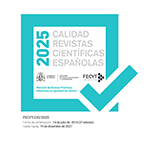Canons in Media Language and Professional Voice
Abstract
Linguistic prescriptivism is an ideology and authority based practice that has traditionally vindicated the use of norms of language as social conventions on correctness, appropriateness, aesthetics and validity, also affecting media language. The aim of this paper is to explore the theoretical underpinnings of the Script Design model, which underlines the need to consider not only responsive and even initiative based performance, but also the script or use of a professional voice, as part of structural constrains, that conditions the individual linguistic behaviour in public occupations. The debate on responsive-initiative motivations in stylistic variation is a central issue of the traditional pendulum-oscillating di-lemma in social theory about the relationship between structure and agency, i.e. between sociolinguistic limitations and creativity, and also between speaker intention and listener understanding. Despite their social or regional background, speakers modify their linguistic production in public depending on the market characteristics and the structural constrains. The spirit of the Script Model, therefore, alludes to the standing debate in both classical and contemporary sociological theory over the primacy of social structure or agency in shaping human behaviour and the meaning of human behaviour itself.Downloads
Article download
License
In order to support the global exchange of knowledge, the journal Complutense Journal of English Studies is allowing unrestricted access to its content as from its publication in this electronic edition, and as such it is an open-access journal. The originals published in this journal are the property of the Complutense University of Madrid and any reproduction thereof in full or in part must cite the source. All content is distributed under a Creative Commons Attribution 4.0 use and distribution licence (CC BY 4.0). This circumstance must be expressly stated in these terms where necessary. You can view the summary and the complete legal text of the licence.









